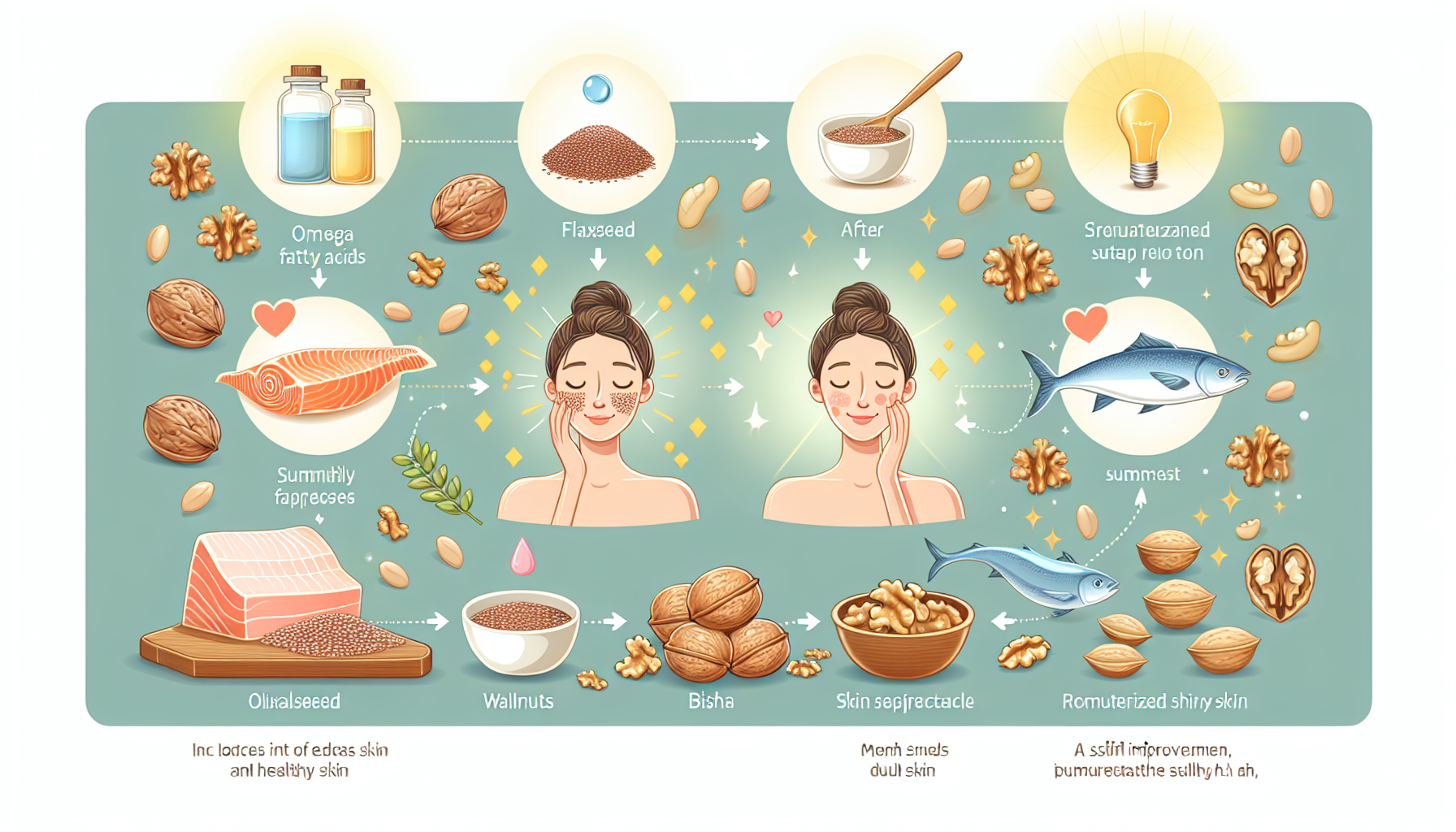Omega fatty acids are essential for maintaining skin health, offering benefits that include enhancing skin moisture, reducing inflammation, and protecting against the signs of aging. Let’s delve into the specifics of how these fatty acids benefit the skin and how they can be incorporated into your daily routine.
Omega Fatty Acids: The Skin’s Ally
The skin, being the largest organ of the body, requires a range of nutrients to stay healthy, and among these, omega fatty acids are critical. There are several types of omega fatty acids, but the most relevant to skin health are omega-3s and omega-6s, which are polyunsaturated fatty acids (PUFAs) that the body cannot produce on its own.
Omega-3 Fatty Acids and Skin Health
Omega-3 fatty acids, found in foods like fatty fish, flaxseeds, and walnuts, play a significant role in skin health. They are responsible for the health of the cell membrane, which acts as a barrier to harmful substances and a passageway for nutrients and waste products. Strong and healthy cell membranes result in softer, more supple, and more moisturized skin.
Moreover, omega-3s possess anti-inflammatory properties that can alleviate symptoms associated with skin conditions like psoriasis and atopic dermatitis. They may also protect against sun damage, as suggested by some studies indicating that omega-3 fatty acids can reduce the skin’s sensitivity to ultraviolet (UV) radiation.
Omega-6 Fatty Acids and Skin Health
While often less celebrated than omega-3s, omega-6 fatty acids are equally important for skin health. These fatty acids, found in oils such as evening primrose oil and borage oil, are vital for skin growth and development. However, it’s essential to maintain a balance between omega-3 and omega-6 intake, as too much omega-6 can promote inflammation.
Gamma-linolenic acid (GLA), an omega-6 fatty acid, has been shown to be particularly beneficial for the skin. GLA can help reduce acne by decreasing skin inflammation and reducing the number of skin cells that cause lesions. It may also help the skin retain moisture.
Linking Omega Fatty Acids to Overall Health
While the focus is on skin health, it’s worth noting that omega fatty acids are also pivotal for overall health and wellness. They contribute to cardiovascular, brain, and joint health, among other benefits. For more comprehensive information on maintaining skin health, you can explore further at Avix Health’s dedicated skin health page.
Incorporating Omega Fatty Acids into Your Diet and Skin Care
Dietary Sources
Incorporating omega fatty acids into your diet is straightforward with the inclusion of specific foods:
- For Omega-3s: Fatty fish like salmon, mackerel, and sardines; nuts and seeds like flaxseeds, chia seeds, and walnuts; and plant oils like flaxseed oil and canola oil.
- For Omega-6s: Poultry, eggs, nuts, and vegetable oils like soybean and sunflower oil.
Topical Application
Topical application of omega fatty acids can also be beneficial. Products containing omega-rich oils can help fortify the skin barrier and provide moisture. Some natural ingredients that boost skin health, like those mentioned in Natural Ingredients That Boost Skin Health, can be directly applied to the skin.
Balancing Omega Fatty Acids for Optimal Skin Health
Achieving the right balance of omega fatty acids is crucial. While omega-6 fatty acids are abundant in the Western diet, omega-3s are less common, which can lead to an imbalance and result in increased inflammation. Striving for a balance of omega-3 and omega-6 fatty acids can lead to better skin health and overall wellbeing.
For more information on the role of diet in skin health, refer to How Diet Affects Skin Health Over Time.
Research and Studies
Research into the benefits of omega fatty acids for the skin is ongoing, with studies revealing their potential in a variety of applications. One such study indicates the role of omega-3 fatty acids in mitigating the effects of photoaging, the premature aging of the skin due to repeated exposure to UV radiation.
Another research explores the use of omega-6 fatty acids in treating conditions like atopic dermatitis, finding that they can have a therapeutic effect.
External Resources for Further Reading
For those interested in diving deeper into the scientific understanding of omega fatty acids and skin health, here are some niche and specific resources:
- The National Center for Biotechnology Information offers a wealth of peer-reviewed studies on the impact of omega fatty acids on skin health.
- The American Academy of Dermatology provides guidelines and position statements on the role of diet, including fatty acids, in skin care.
Conclusion
The connection between omega fatty acids and skin health is clear and well-established. These nutrients play a vital role in maintaining the skin’s moisture, flexibility, and overall health. By incorporating them into your diet and skin care routine, you can harness their benefits for a healthier, more radiant complexion.
For a holistic approach to skin care that considers various factors affecting skin health, you might find The Role of Skin Care in Holistic Wellness to be an insightful read.
Remember, while diet and topical treatments are essential, regular check-ups with a dermatologist can also help maintain skin health and catch any issues early on.



